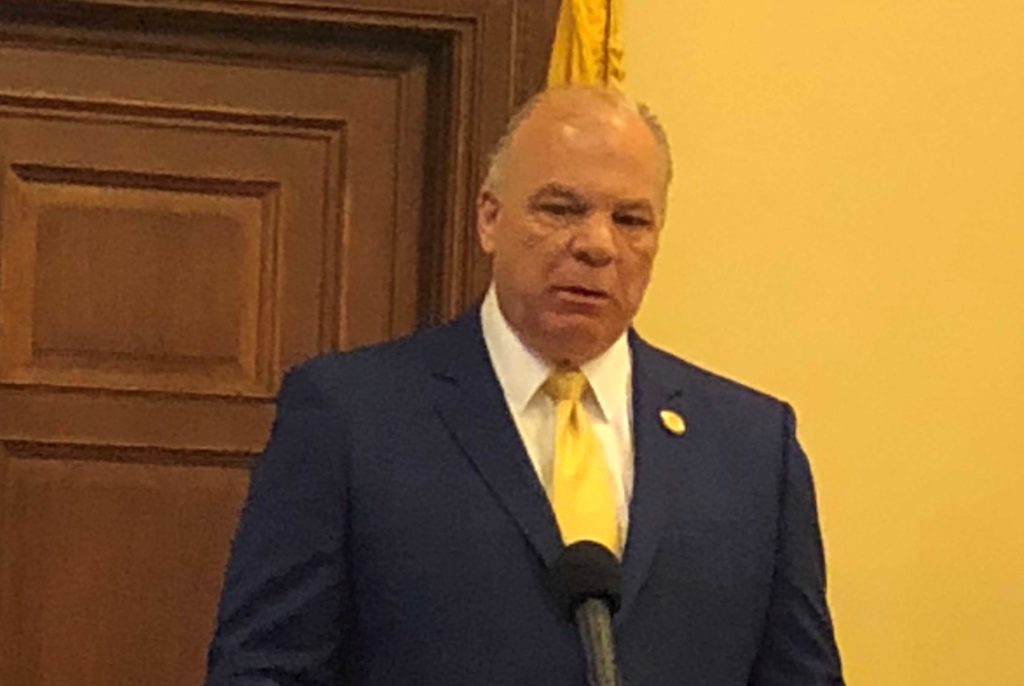Senator Sweeney Proposes NJ Transit Funding Solution

Senate President Steve Sweeney today unveiled a plan to dedicate $500 million a year from the Corporation Business Tax, the New Jersey Turnpike and the Clean Energy Fund to New Jersey Transit’s operating budget, providing much-needed financial stability to the embattled agency.
“The absence of consistent funding for NJ Transit operations has undermined its ability to provide safe and reliable service,” said Senator Sweeney. “Dedicated funding will help prevent the diversion of resources needed to improve basic services so the agency can bring an end to the breakdowns, delays and service failures that have plagued the system far too long.
“The uncertainty leaves an agency that requires stable funding at the mercy of fiscal conditions and political circumstances that can easily fluctuate. This has been a long-standing problem that needs a long-term solution,” said Senator Sweeney (D-Gloucester/Salem/Cumberland).
The plan calls for the constitutional dedication of $300 million a year from the Corporation Business Tax, $125 million from the New Jersey Turnpike, and $75 million from the Clean Energy Fund to NJ Transit. It would also place an outright ban on capital-to-operating transfers from state funding sources like the gas tax and sales tax, and put a hard cap on similar transfers from federal funds.
For NJ Transit to make desperately needed service and performance improvements the state needs to end the practice of diverting hundreds of millions of dollars away from the capital projects, said Senator Sweeney.
“Capital-to-operating transfers are like eating your seed corn,” Senator Sweeney said. “The reason our trains and buses break down so much is that we don’t have the capital dollars needed to replace them on a timely basis. We need to put capital dollars into capital. That’s the only way we can expand mass transit ridership to the levels we can and should achieve in the most densely populated state in the nation.”
Most major transit agencies in the nation have a dedicated source of operating funding that covers 50 percent or more of its non-farebox costs, NJ Transit gets just 1.6 percent of its revenue from dedicated sources.
“Investing in NJ Transit is one of the most important investments we can make to spur New Jersey’s economy, protect our housing values and improve the quality of life for hundreds of thousands of New Jerseyans who depend on NJ Transit to get to work, to school, to shopping and doctor’s appointments, and back home every day,” said Senator Sweeney. “This is a comprehensive approach that shares the cost of NJ Transit’s dedicated operating revenue fairly.”
Senate President Sweeney’s plan would:
- Dedicate $300 million a year from the Corporation Business Tax to NJ Transit’s operating budget by constitutional amendment. This will be accompanied by legislation amending the CBT surtax to keep it at 2.5% (11.5% combined) until the state makes its full actuarially required pension contribution in FY 2023. The extra 1% surcharge on companies making over $1 million is projected to raise $250 million to $300 million this year and rise in future years based on current collection patterns. Most of the tax is paid by out-of-state companies.
- Dedicate $125 million annually in New Jersey Turnpike revenue currently going to NJ Transit’s operating budget on a permanent basis, either by constitutional amendment or statute. New Jersey’s motorists and the out-of-state drivers who pay a high percentage of Turnpike tolls have an interest in reducing traffic and increasing mass transit.
- Dedicate $75 million annually from the Clean Energy Fund to NJ Transit’s operating budget on a permanent basis by constitutional amendment. The fund is a vital part of any strategy to meet our 2050 clean energy goals.
- Prohibit the transfer of capital funds to operating expenses from state revenue source in the Transportation Trust Fund by constitutional amendment and put a hard cap on federal capital-to-operating transfers by statute.
“Senate President Sweeney’s proposal is an important step forward in helping to get a stable funding source for NJ Transit. We fully agree with using $300 million Corporate Business Tax to help fund operations and maintenance. We also think that taking $125 million from the turnpike makes sense because funding mass transportation means less cars on the road, less traffic on the turnpike, and helps reduce air pollution. The one thing we are concerned with is that the plan will divert $75 million from the Clean Energy Fund. This money should be going toward helping low- and moderate- income families and businesses save money on electric bills and reduce pollution through energy efficiency,” said Jeff Tittel, Director of the New Jersey Sierra Club. “When the Transportation Climate Initiative comes into effect, it will bring $750 million a year towards transportation improvements and electrification of our transit system. These funds could replace the monies that are being diverted from the Clean Energy Fund.”
“There are other alternatives to fund operations and maintenance, like adding a value-added tax on properties around transportation improvements, like in L.A. and San Francisco. They could also have parking fees in downtown and commuter areas, or implement parking cash out programs where employers reward employees for taking public transit. The system we have now is broken because NJ Transit is robbing $460 million in capital funds for operations and maintenance. Diverting capital funds means that they don’t have the money for improvements and to expand lines like the Hudson-Bergen and South Jersey lines. This is like robbing our future to pay for current expenses, or taking a second mortgage on a house to buy groceries,” said Jeff Tittel, Director of the New Jersey Sierra Club. “Now we have an opportunity to fix this broken system. People in New Jersey spend more money to be stuck going nowhere with NJ Transit. This plan will help NJ Transit move forward.”









Leave a Reply